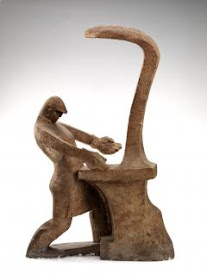 |
| Aaron Goodleman, The Drillers, 1933. Photo: Skirball Museum, Los Angeles. |
 |
| Aaron J. Goodelman, The Empty Plate, ca. 1930, plaster/cast and joined, Smithsonian American Art Museum. |
 |
| Aaron J. Goodelman, Happy Landing, ca. 1930, Tennessee marble, Smithsonian American Art Museum. |
Happy Birthday Aaron J. Goodleman (1890-1978)
by Samuel D. Gruber
Today is the birthday of Aaron J. Goodleman, and Russian-born American-Jewish
sculptor not widely known, but whose work deserves more attention for its
formal qualities, its craftsmanship, and its social and political message. Goodelman was also an accomplished illustrator and etcher, and a frequent lecturer and
teacher.
He was born Ataki, Russia and studied at an art school in
Odessa before immigrating to New York as a teenager in 1905. He studied at at the Cooper Union and the National Academy of
Design, and in 1914, just before war broke out in Europe, he studied with Jean-Antoine Injalbert at the Ecole des Beaux-Arts
in Paris.
In the 1920s he worked as a machinist and during this time became a
communist and exhibited at the John Reed Club in the early
1930s. During this time strove to express themes of social and economic justice in
his art. Perhaps his best known work today is his sculpture The Drillers (1933), now in the collection of the Skirball Museum, Los Angeles.
"Sculpture is a language, and . . . if I talk I want people to know I am
not just talking in the wind but I have something vital to state.”- Aaron Goodleman
He was a Yiddish speaker and remained active in Yiddish culture
throughout his life, joining the Yiddish-speaking branch of the
Communist Party, but also illustrating many Yiddish children's books, such as the 2-volume Khaver-pavers mayselakh (1925) which contains thirty-seven illustrated short stories for very young children, in relatively easy Yiddish. Goodleman also provided illustrations for the children's journals Young Israel, Kinder Journal and Joseph Gaer's books The Burning Bush and The Unconquered.
 |
| Aaron Goodleman. Book cover. |
Goodleman was a founding member of the Society of
American Sculptors and for many years taught at the Jefferson School
of Social Science. He taught at City College of New York in the 1960s.
After World War II, Goodelman created art commemorating the
Holocaust. I have not found images of these works, so if readers have information I would like to hear more.
 |
| Aaron J. Goodelman, Kultur, ca. 1940, carved, stained and waxed wood, and formed and welded metal, Smithsonian American Art Museum. |
 |
| Aaron Goodleman. Torso, 1939-1940. Photo: online auction site. |
 |
| Aaron Goodleman. Untitled (Girl with Fountain), 1952. Photo: online auction site. |











No comments:
Post a Comment